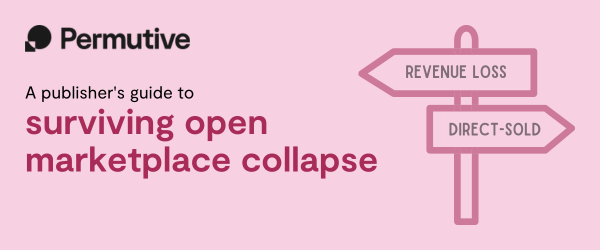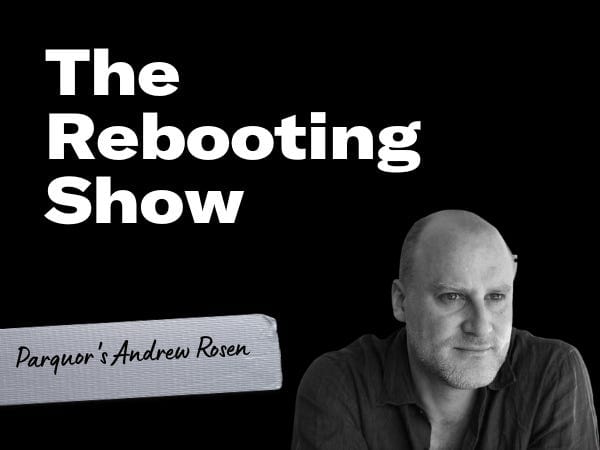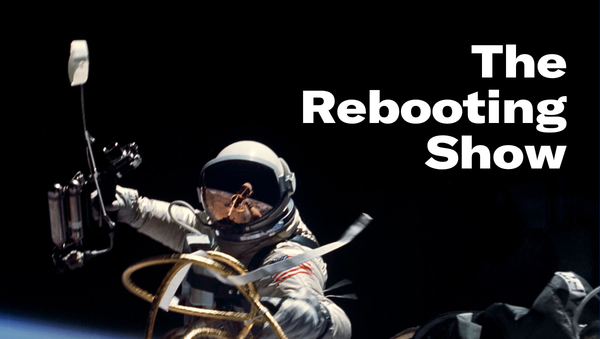Hollywood's doom loop
Parquor's Andrew Rosen on the painful shift from a wholesale to retail model

Video is now 65% of all internet traffic. It also happens to be one area with high ad rates. The Rebooting has partnered with VideoElephant to research how publishers are using video, how much it is growing as part of their overall businesses, and where the challenges lie. If you work at a publisher, please take this two-minute survey to contribute your insights. I’m going to turn it into the first piece of research from The Rebooting that will be available next month.
This week, I spoke to Parquor’s Andrew Rosen, a former Viacom exec turned media analyst, to unpack Hollywood’s weird summer of transition. First up, a message from The Rebooting supporter Permutive.

Take the direct path

Over the last few years, we have seen a shift away from open marketplace (OMP) into more direct-sold channels with publishers. What began as a trickle has become a wave, with reported revenue numbers telling a clear story. In Q4 2022, OMP revenue was down 25% YoY, while direct-sold was up 37%, accelerating to 55% in Q1 2023. Publisher CROs cannot afford to lose revenue, and advertisers only want to reach relevant audiences. Use this guide to look beyond OMP revenue and drive ad sales with direct-sold partnerships.
Hollywood’s retail doom loop

As a young reporter, I was naive and regularly shocked and dubious when I was told that companies failed to embrace the obvious direction of the internet because they weren’t incentivized to make the necessary changes to their models. And of course, that’s what happened. As the ever-quotable Rishad Tobaccowala used to say, “Change sucks, irrelevance is worse.”
Hollywood is in the midst of a wrenching change brought on by shifts in distribution. Economics change when distribution changes. The “streaming wars” are becoming a faint memory, and the realities of the messiness of streaming, not to mention how AI gets applied, settles in. Roiled by strikes of actors and writers for the first time in a generation, the entertainment business faces the kind of wrenching change that publishers have already endured.
This week’s episode of The Rebooting Show features a conversation with Andrew Rosen, a former Viacom executive who runs Parquor and publishes The Medium, an essential newsletter that unpacks the strategy behind the entertainment business. He sees streaming as a bad business model, at least compared to how things were, with various windows to make more money. Matt Damon broke this down well between bits of buffalo wings.
The coming years will serve as a business school case study of how executives steeped in an old world figure out terra incognita. It’s hard to see people like David Zaslav and Bob Iger as burn-the-boats guys. Beyond Zaslav being heckled by college students and Iger admonishing greedy creatives after landing on his private jet in Sun Valley, Wall Street is losing patience and confidence that the Sun Valley crowd is going to figure this out, as Claire Atkinson has noted. After all, you don’t often see the capital class siding with workers over managers, while nearly half of Warner Bros. Discovery shareholders voted against Zaslav’s reliably hefty pay package.
“The thing that I experienced was how do you evolve when everybody in the building is looking at operating income and looking at cash flow and saying, if we disrupt this, we are the stupidest people that's ever inhabited these positions?” he told me on this week’s episode of The Rebooting Show. “Senior management are counter-incentivized to innovate. People are paid money not to innovate.”
The record-breaking success of Barbie and Oppenheimer in the theaters is the exception, not a harbinger. Netflix is past its wobbles. It added nearly 6 million subscribers with its password sharing crackdown and has seen its stock rise by nearly 50% this year. In contrast, Disney+ lost 4 million subscribers and its stock is flat when the overall market has been up 20% for the year.
“Can [legacy media execs] do this thing that your MBA didn't teach you beyond the basic economics of it, that the computer guys next to you understand much better than you, and oh yeah, you have a mortgage to pay and kids' school to pay for?” Andrew said. “There are human costs associated with that. I think that has gotten lost in the love for innovation.”
But denial isn’t much of a strategy. The direction of the media business is moving to a retail model, where companies have a direct connection to their customer base, rather than a wholesale model of relying on others for distribution. In different ways, companies like The New York Times and Crunchyroll are examples of this shift, Andrew believes.
David Zaslav has aced the wholesale marketplace and but he does not get retail and the weight [of the market] is moving to retail.”
In “The Doom Loop of the Mogul,” Andrew laid out the dilemma facing the media mogul class, as the losses in streaming dent management credibility and “may force the hand of Wall Street to push for new strategic, financial and/or management structures that hold management responsible for the outcomes of streaming losses, a lack of profitable business models and even the writers’ and actors’ strikes.”
“The doom loop of the model is that maybe streaming is just a bad business model and it incentivizes really bad decisions by CEOs,” he said. “If you think through how those decisions play out, it's that [for] legacy media management, the wholesale relationship with consumers is their strength.”
Listen to the full episode for Andrew’s insights on the retail shift, why Bob Chapek got a raw deal and why the push for transparency is a hornet’s nest for many.

Stop leaving money on the table
If you’ve invested in creating engaging content and rich advertising experiences for your audiences, shouldn’t you be equally rewarded by advertisers who value those that are paying the most attention? But without knowing who is truly engaged with your content, you’re left in the dark. Discover how you can identify, target, and broadcast to buyers your high-value audience segments with our free ebook, “Capturing the Signals: How Reader Attention Can Drive More Revenue.”
Recommendations
Return of the microsite: Everything comes back in fashion. The push for brands to experiment with AI chatbots will lead to all kinds of attempts by publishers to get a piece of shrinking experimental budgets with efforts like this chatbot from Complex for Sprite. (Adweek)
Peak news: There is a self-serving mantra from the news industry that the more news, the better. There’s a rational case to be made that most people need to be less engaged with news, particularly political news. It’s hard to say that the explosion of news coverage has made for a more informed citizenry or healthier society. “No news is the real news,” New Zealand chef Monique Fiso put it. “The 24/7 news cycle is a distraction soup of doom and gloom. It’s overwhelming and often doesn’t contribute to you being an informed citizen. It has the opposite effect in my opinion.” (Monocle)
The middleman problem: Programmatic advertising is something many publishers both love and loathe. They like the efficient Ad demand but gripe over quality issues and loss of control over ad relationships. Add in the risk of not getting paid when an ad tech company goes under. MediaMath’s bankruptcy is causing some supply-side platforms, even Microsoft-owned Xandr, to withhold payments to publishers. With partners like these… (AdExchanger) https://www.adexchanger.com/publishers/xandr-tells-publishers-it-wont-cover-unpaid-mediamath-deals/
The company of one: More people will choose independent career paths, both out of choice and necessity. The all-or-nothing corporate model has long been outdated and in need of replacement by more flexible arrangements as “companies begin re-aggregating expertise around projects versus having hordes of generalists or people hanging around for a project.” (Rishad)
Plus: The reality is 3-5% is a good free-to-paid conversion rate; thanks to SEO, there’s too little attention placed on cool and too much on cheap; and never have a splashy launch party because if things don’t work out it will become an anecdotal lede.
Thanks to Permutive and Sovrn for their support. Check out how Permutive helps publishers wean themselves from the open marketplace and Sovrn’s guide to smart audience segmentation for higher revenue.
Send me your feedback by hitting reply.
Also, consider sponsoring The Rebooting. You can find out more here, and get in touch: brian@therebooting.com.




